
The environmental challenges facing our planet have never been more acute. SEFARI research helps to show how we can protect and restore our natural capital – our soils, biodiversity and ecosystems – and develop effective ways to manage the land and water to improve environmental condition. SEFARI works to better understand how biological, chemical and physical processes can allow us to tackle climate change, adapt to changes coming our way, and build a more resilient and well-functioning environment.
Sector Contact

Case Studies

In this blog Professor Lorna Dawson, Gateway knowledge broker for Environment and Soil, shares some insights after visiting RBGE in August 2025. SEFARI Gateway worked with Scotia Agricultural Club to orchestrate this interesting and inspiring visit to the garden. Scotia Agriculture Group has the aim of bringing together people with experience of interdisciplinary approaches to food production and seek a balanced judgement of the long term effects of innovation on the conservation of the land. Certainly there was a lot of innovative and interesting work going on at RBGE to inspire the group.
SEFARI Gateway provides bespoke access to the RESAS portfolio’s research expertise and analysis to ensure scientific evidence helps inform the health, wealth and well-being of Scotland’s people. The Royal Botanic Garden Edinburgh (RBGE) is part of the SEFARI collective (i.e. Moredun, James Hutton Institute, SRUC, Rowett, BioSS, RBGE) supporting the current and next generation of researchers to ensure the science undertaken has real world impact.
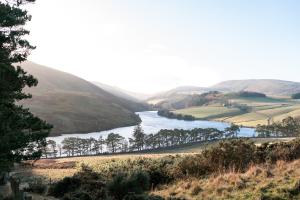
💧 Water for Change: Scotland's Drive Toward Collaborative Water Governance
On March 22, 2025, Scotland celebrated World Water Day (WWD) with renewed energy and vision. Led by the Hydro Nation International Centre (HNIC), in partnership with the Strategic Research Programme (SRP) including the Centre of Expertise for Waters (CREW) and the Hydro Nation Scholars Programme (HNSP) and supported by SEFARI Gateway, this year’s celebration spotlighted how collaboration can turn science into action.
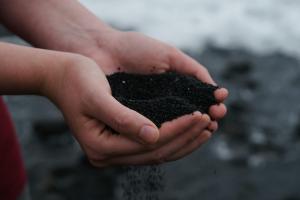
Soil erosion remains one of the most pressing agricultural issues worldwide. It is still happening - the intensive way we farm is destroying and degrading the very basis of our entire food system, soil. In this opinion piece, Professor Lorna Dawson, SEFARI’s Knowledge Exchange Lead for Environment, discusses the issues and solutions to keep our soil healthy and productive.
Soil as a precious resource (Image by Seth Cottle, Unsplash)
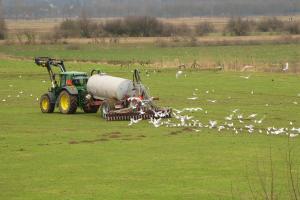
The interaction between nutrient management, food production and sustainability goals are complex, where both research and policy still remain fragmented. The report from the Nutrient Management Expert Group (NMEG), commissioned by DEFRA to tackle this complexity, was published in May 2024, containing the detailed assessment of the key policy and 15 recommendations. This blog summarises the key takeaways from this work.
Slurry Spreader (Credit: Saxifraga, Harry van Oosterhout, CC BY-NC-SA)
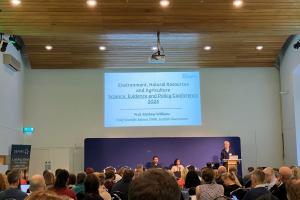
Climate Change Adaptation is one of the key items on the policy agenda in Scotland, and this was the main focus at this year’s ENRA Science, Evidence and Policy conference.
Organised by the Scottish Government’s Rural & Environmental Science and Analytical Services (RESAS) and held at Edinburgh’s Dynamic Earth, the conference brought together researchers and policymakers from across the rural and environment research and policy landscape in Scotland and showcased Scottish Government (RESAS) funded research evidence that is supporting climate change adaptation.
Title Image: Opening keynote by Prof Mathew Williams (Photo by Alöna Roitershtein)
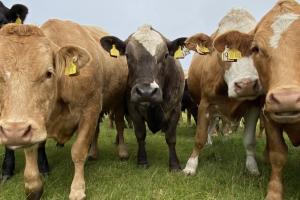
SEFARI Gateway are a silver sponsor at this year’s A3 Scotland conference - a not-for-profit two-day conference for the Animal Health, Agritech and Aquaculture (AAA) sectors, attracting attendees from all over the world to Inverness, to participate in plenaries, breakouts, investor panel and start up pitching, and sessions on funding, international showcase, skills and emerging solutions in AI, robotics, and sensors.
Our work across the Scottish Government’s Environment, Natural Resources and Agriculture (ENRA) Strategic Research Portfolio makes a substantial contribution to the A3 sector in Scotland. Read on to find out more about our A3 related work.
Cattle in Orkney (Photo by Alöna Roitershtein)
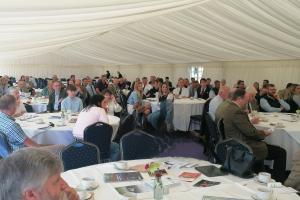
Supported by SEFARI GAteway, the Royal Bank of Scotland, the RSA, and in particular the RSA Fellows Borders Network and the RSA Fellows Rural and Environmental Issues network Scotland and NFU Mutual, over 100 guests attended the Business breakfast from 8:30 until 10:30, in the Members Marquee, organised and welcomed by RSA fellow Mrs Ann Packard, FRSA, HonFRIAS.
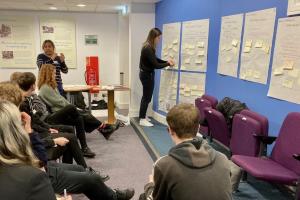
How daunting and frustrating it must feel to be a young person now - as climate change gathers pace there is more uncertainty about what the future holds. Furthermore, many feel failed by society and powerless to influence the direction of travel.
Although schools are tasked with preparing children for the future and providing the skills and knowledge for the transition to Net Zero, teachers often feel similarly ill-equipped to fulfil this role and uncertain how to guide young people towards the careers and jobs needed for the transformation.
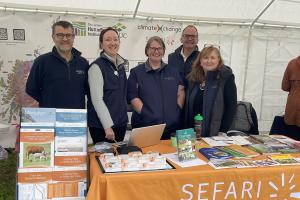
During this year’s GO Falkland gathering, in the foothills of the mighty East Lomond Hill on the beautiful Falkland estate, an enthusiastic collective of farmers, growers, artists, scientists and policymakers came together to discuss what Regenerative Farming, Forestry, Land Use and Food means for them. During the event, we shared experiences and insight to collaboratively work towards the shared goals of the sustainable future.
SEFARI and SEFARI Gateway were there to contribute to and support these conversations over the two days. Find out more in this blog.

Luis Loria-Rebolledo, Dwayne Boyers and Verity Watson from the University of Aberdeen’s Health Economics Research Unit were recently awarded a joint SEFARI Gateway and PHS Fellowship. The Fellowship team are seeking to build on the National Health Service (NHS) Scotland Climate Emergency and Sustainability Strategy and previous research commissioned by Public Health Scotland (PHS) and NatureScot.
In this blog, the team describe the background to this project and how they will attempt to answer the following questions:
How are NHS outdoor spaces used?
What is their health and wellbeing value to different users?
What is the value to NHS staff?
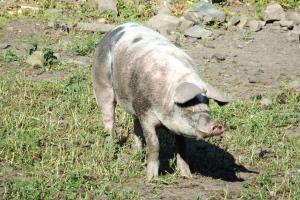
Collaboration amongst partners in an agri-food supply chain can bring benefits for its members and boost the chain competitiveness. However, often such collaboration needs an incentive to motivate change.
In this blog, Cesar Revoredo-Giha discusses how reducing GHG emissions may provide such an incentive for supply chains to become not only more collaborative but also fairer for agri-food producers.

Hope, positivity, and optimism were the takeaways from the 2024 Edinburgh Conservation Film Festival, hosted by the Edinburgh Science Festival and supported by SEFARI Gateway.
For the past three years, the festival has invited the submission of short films to shine a light on the work of people, communities, and organisations from all over the world that are working to protect, restore and enhance the biodiversity of our shared planet.
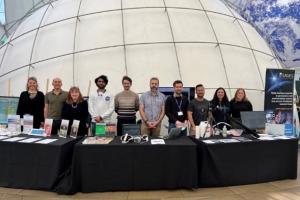
Over 600 school children aged 11 to 18 years old from 9 council areas in Scotland attended the ‘Your Plant-Your Future’ event at Our Dynamic Earth, Edinburgh on 5th March 2024. The aim of the event was to engage young people, raise awareness of the many environmental issues facing Scotland today, and inspire them to consider a future in a STEM related career- in an attempt to address the skills gap that currently exists. Pupils explored the amazing opportunities that can be unlocked through STEM pathways at school and beyond.
In this blog, hear more about the event which bought together >20 partners across research, industry, further and higher education to showcase exhibits and inspire the next generation of scientists through enthusiastic discussion and interactive displays.

Dr Zisis Gagkas believes that “We shouldn’t be doing research just for research’s sake, it should be about research making an impact and helping to meet society’s needs”. Therefore, Zisis decided to apply for a SEFARI Gateway Fellowship where he could work with policy colleagues to help with better land-use decision making.
In this blog, hear directly from Zisis about his Fellowship. If you’d like to follow a path that helps increase the policy relevance of your research, then read on to discover whether the scheme could be the right opportunity for you too.
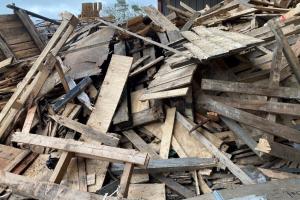
Overconsumption and high levels of resource use are challenges contributing significantly to the climate and biodiversity crises. Scotland is currently only 1.3% circular, meaning that over 98% of the products consumed in Scotland come from newly extracted materials, and only a small proportion of these materials are ‘cycled back’ into use in the economy. In other words, most of what we buy, use or consume in Scotland is not reused again within Scotland, despite the huge potential to do so.
In this blog we give a brief overview of what the ‘Circular Economy’ is and how it aims to address the issue of consumption and waste in a world where resources are finite. This blog also introduces the ‘Circular Economy: people, behaviours and skills’ project, which is part of the current RESAS Strategic Research Programme (2022-2027).
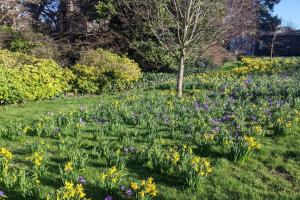
One important and often overlooked aspect of PhD training is the chance to meet other researchers in the same or similar field as you, allowing for knowledge exchange and the forging of new connections.
Therefore, when the opportunity to visit other institutes across SEFARI arose, Karen wanted to capitalize on this. In this blog, find out about Karen’s experience as part of the SEFARI Gateway PhD Exchange Scheme - SEFARI’s second student to make the most of this opportunity.
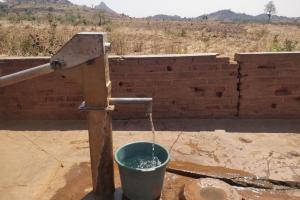
Serious gaming is a growing field in which games are used to provide a fun and educational method of science communication. Gaming offers opportunities in communicating challenging and complex issues to stakeholders and communities to improve land management practices.
Through a SEFARI Gateway funded Innovative Knowledge Exchange project, we are developing a game highlighting the challenges in land and water-management in Malawi. In addition, we are also investigating the opportunities on how we might use what we’ve learnt to develop a similar game relevant to the challenges more applicable to the Scottish context.
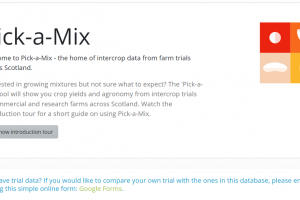
The way we currently produce food and other agricultural products is under threat from the changing climate, depleted biodiversity, and declining availability of natural resources used to boost productivity. We know that farming systems need to shift towards co-delivering for nature and net zero, but this needs to happen without compromising production and food security.
Farming faces huge challenges from these pressures, while coping with climate variability, degradation of prime agricultural land, and restrictions on pesticide use. In this blog, we try to help with what farmers can do in the short-term to address these multiple challenges.
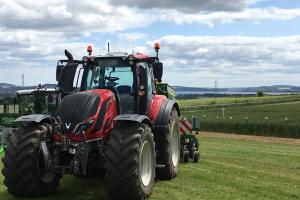
On the 4th of July Arable Scotland returns for the 5th year, a field event which is becoming a firm favourite in the calendar with everyone interested in food production. Farmers, producers, researchers and the policy community come together to discuss key issues such as innovative and sustainable farming.
SEFARI researchers and SEFARI Gateway colleagues will be joining in the conversations at Arable Scotland again. In this blog, find out more about which colleagues will be there and how our research is supporting the arable sector.
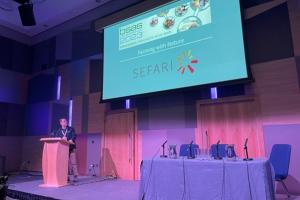
SEFARI Gateway was delighted to sponsor and host a session at the British Society of Animal Science (BSAS) Conference at the Birmingham International Conference Centre at the end of March. Its annual conference regularly attracts several hundred delegates, drawn from across academia and the livestock sector.
BSAS is a charity that ‘works to improve the understanding of all aspects of animal science and to ensure research and knowledge transfer has a practical and beneficial application’, so you can see the obvious parallel with SEFARI!
Pagination
Blog



On April 14th, 1935, the largest dust storm in American history occurred. A black cloud carrying 300,000 tons of topsoil from the Great Plains deposited dust as far away as New York.